Unit 2 healthy eating extensive reading[下学期]
文档属性
| 名称 | Unit 2 healthy eating extensive reading[下学期] | 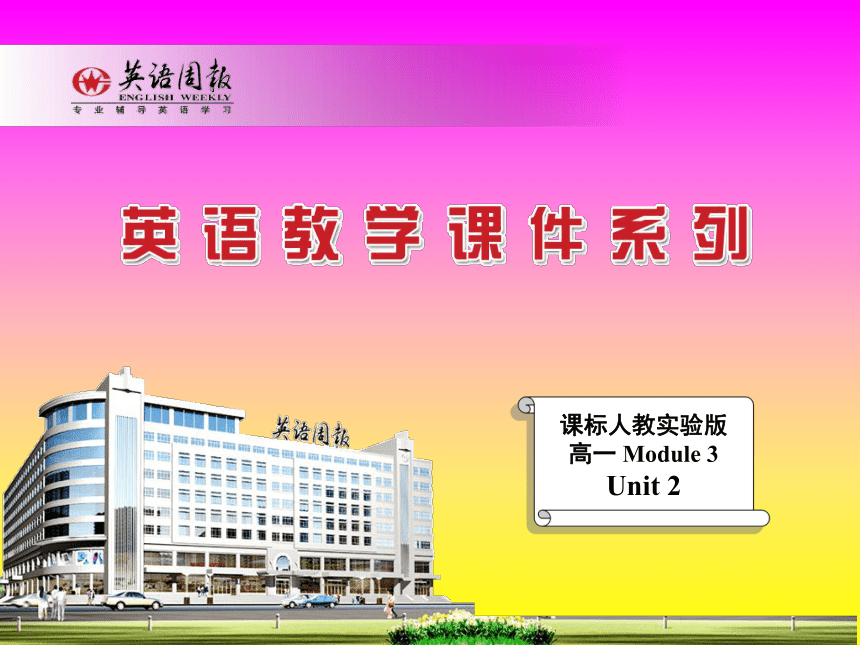 | |
| 格式 | rar | ||
| 文件大小 | 940.0KB | ||
| 资源类型 | 教案 | ||
| 版本资源 | 人教版(新课程标准) | ||
| 科目 | 英语 | ||
| 更新时间 | 2007-03-25 21:20:00 | ||
图片预览

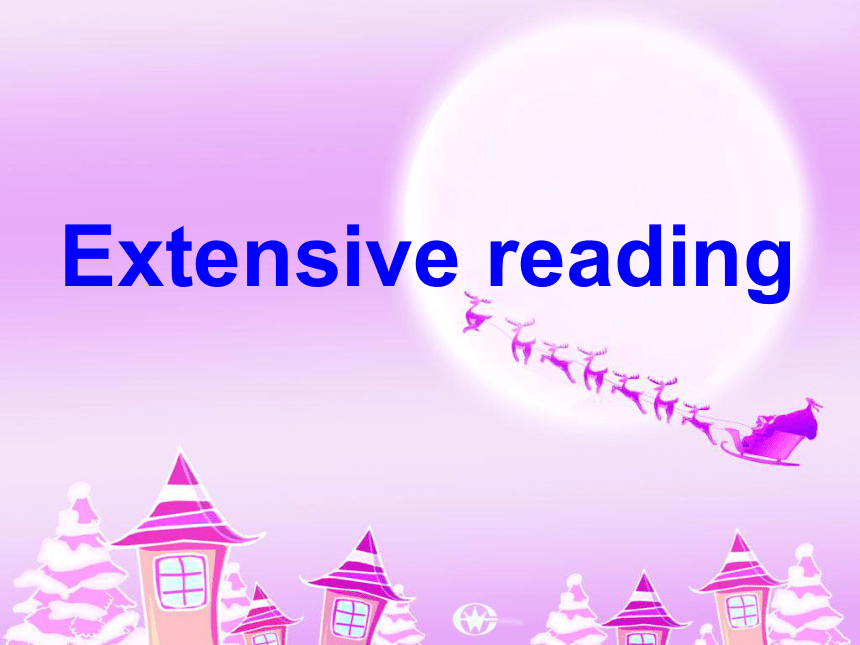
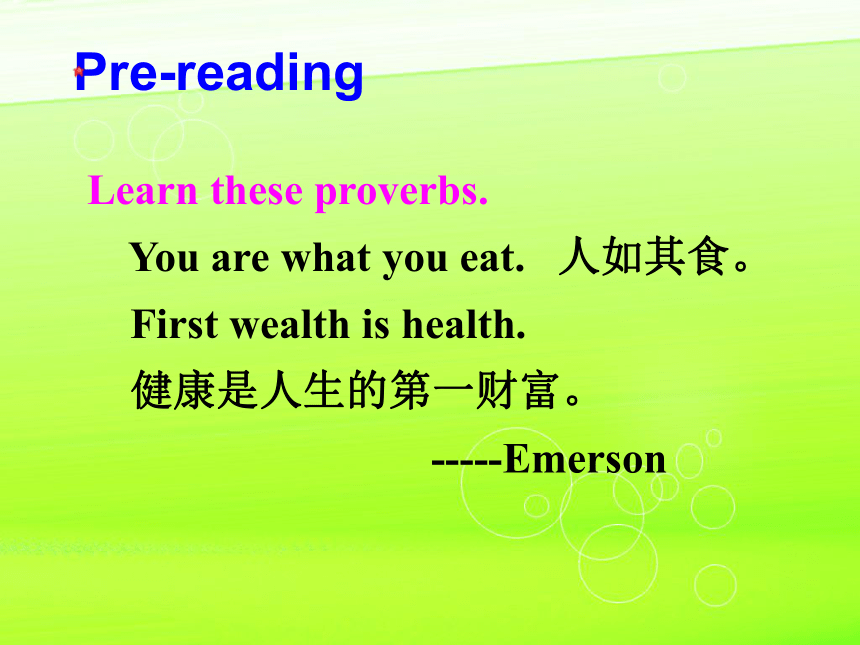

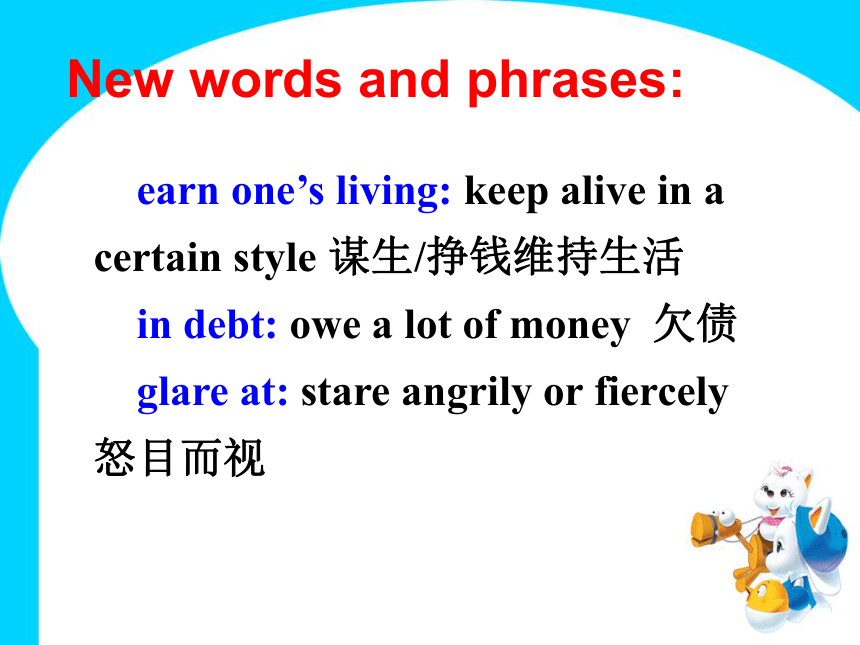
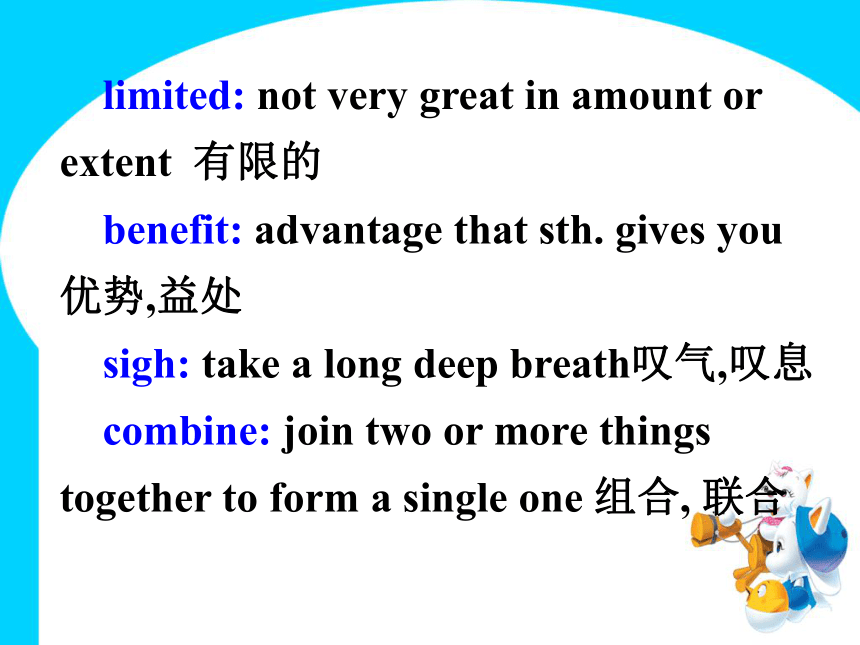
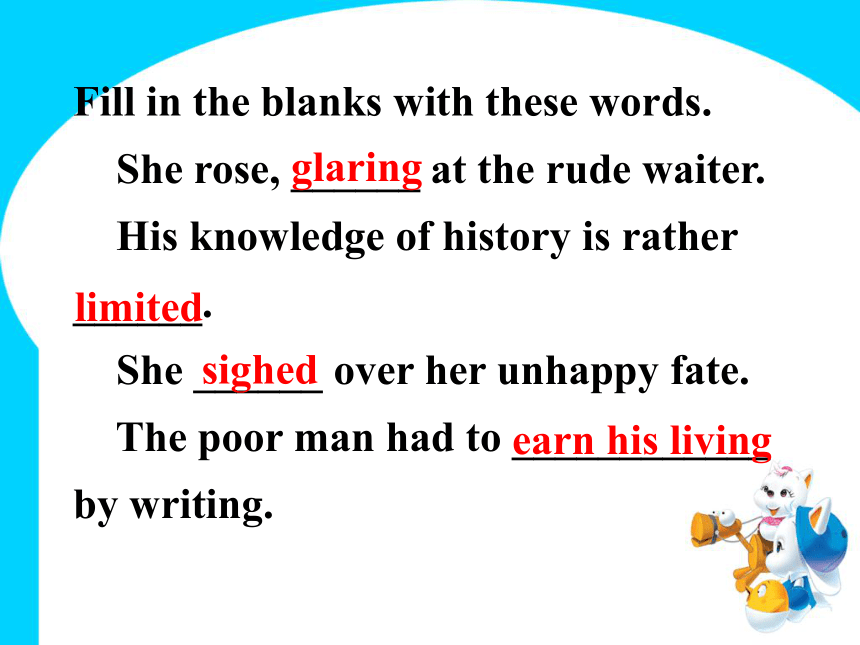
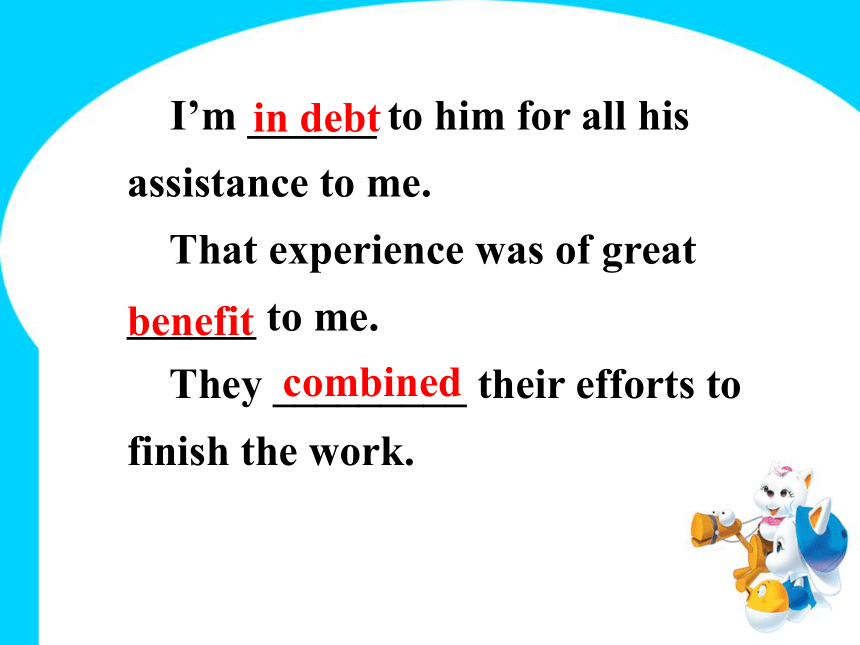
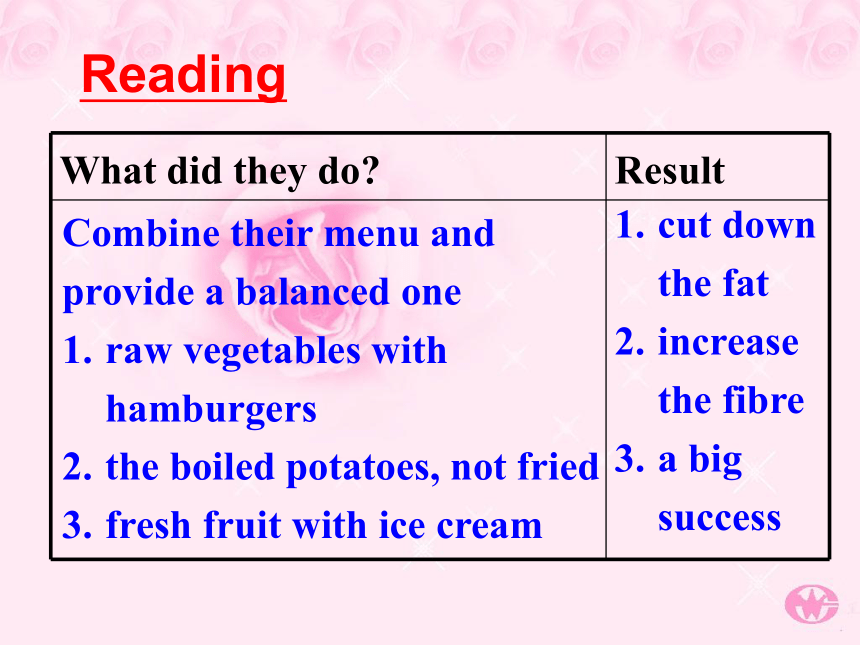
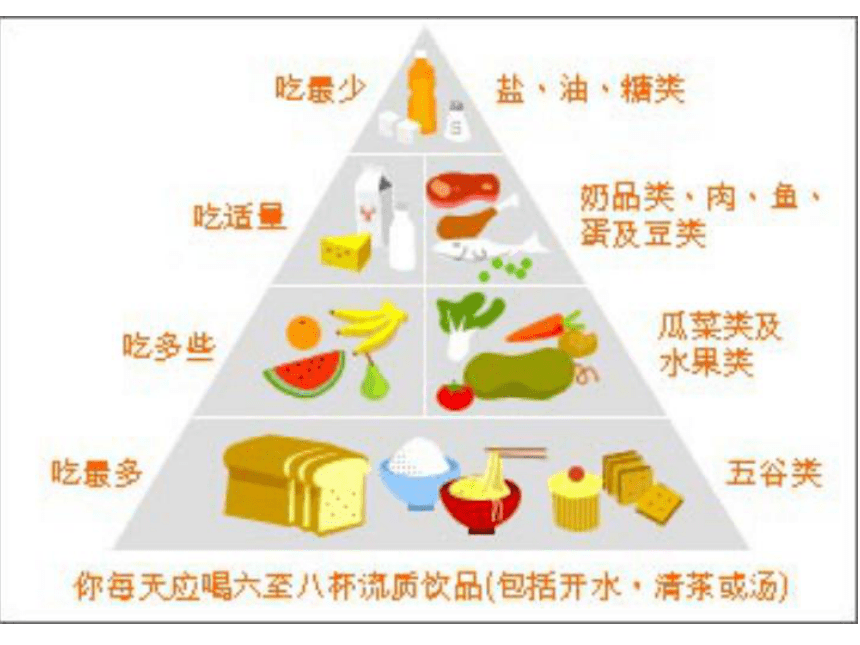
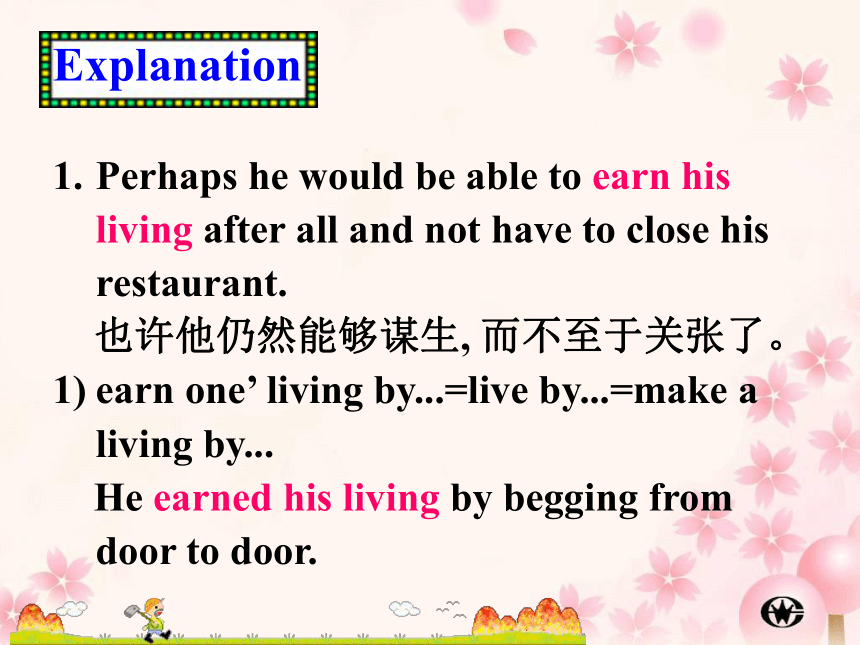
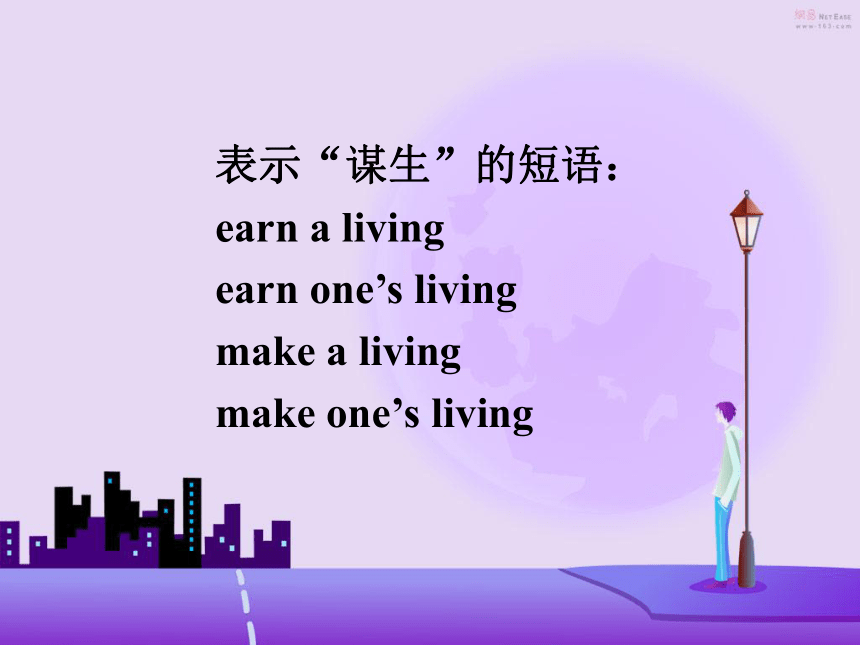
文档简介
课件37张PPT。课标人教实验版高一 Module 3
Unit 2Extensive readingPre-readingLearn these proverbs.
You are what you eat. 人如其食。
First wealth is health.
健康是人生的第一财富。
-----EmersonAn apple a day keeps the doctor away.
一天一个苹果,医生不来找。New words and phrases: earn one’s living: keep alive in a certain style 谋生/挣钱维持生活
in debt: owe a lot of money 欠债
glare at: stare angrily or fiercely 怒目而视 limited: not very great in amount or extent 有限的
benefit: advantage that sth. gives you 优势,益处
sigh: take a long deep breath叹气,叹息
combine: join two or more things together to form a single one 组合, 联合 Fill in the blanks with these words.
She rose, ______ at the rude waiter.
His knowledge of history is rather ______.
She ______ over her unhappy fate.
The poor man had to ____________ by writing.glaringlimitedsighedearn his living I’m ______ to him for all his assistance to me.
That experience was of great ______ to me.
They _________ their efforts to finish the work.
in debtbenefitcombinedReadingCombine their menu and
provide a balanced one
raw vegetables with hamburgers
the boiled potatoes, not fried
fresh fruit with ice creamcut down the fat
increase the fibre
a big successPerhaps he would be able to earn his living after all and not have to close his restaurant.
也许他仍然能够谋生, 而不至于关张了。
earn one’ living by...=live by...=make a living by...
He earned his living by begging from door to door.Explanation 表示“谋生”的短语:
earn a living
earn one’s living
make a living
make one’s living2) earn vt. 挣得;赢得
His success earned him a prize.
He earned fame by helping the students.
He and his wife each___ 10 yuan an hour.
A. earns
B. earn
C. spends
D. takesB2. He did not look forward to being in debt because his restaurant was no longer popular.他可不希望由于餐馆不受欢迎而负债。
debt:【C】sum of money owed to sb. that has not yet been paid 债务; 欠款 (1) be in debt: owe a lot of money 欠债
(2) be out of debt: not owe a lot of money 还清债务
(3) be in sb’s debt: feel grateful to sb. for his help, kindness, etc. 欠某人之情
You saved my life, I am forever in your debt.
他救了我的命,我永远感恩不尽。no longer=not ...any longer 不再
He no longer loves here.
I can’t wait any longer.
1) no more/no longer
no more表示数量上或程度上“不再”
no longer 表示时间上“不再”延续
He is no more a student.
He is no longer young.2) no more...than/not more...than
no more...than ......和......一样不(两者都否定)
not more...than 不如...(前者不如后者)
Xiao Li is no more diligent than John.
小李不勤奋,约翰也不勤奋。
Xiao Li is not more diligent than John.
小李不如约翰勤奋。3. She didn’t look happy but glared at him as she moved round the customers.
她绕过顾客走进来,双眼直瞪着他,看上去很不高兴。 glare vi. 怒目而视
glare at sb. 怒目注视某人glance:
glance (at, over) 看一眼
glimpse:
catch/get a glimpse of 瞥见 glance/glimpse/glare/stare/watch的区别:to look at something quickly and briefly. to see by chance, just for a moment.
瞥见,一瞥 glare:
glare at sb. 怒视某人
stare:
stare at/into 盯着to stare angrily, freely. It emphasizes hostility.
怒视,瞪眼 to gaze intently esp, with wide-open eyes.
盯,凝视 --- What is the boss like?
--- I can’t describe him well, I only
caught a ___ of him as he drove by.
A. glance
B. look
C. stare
D. glimpseD4. I thought you were a new customer and now I find you came only to spy on me and my menu.
我本来以为你是一位新顾客,现在我才发现你只是过来打探我和我的菜谱的。 only to spy... 在句中做目的状语 only to do sth. 表示一个与主语愿望相反的或出乎主语预料的结果,或用来暗示最初的未能实现的动作。
only doing sth. 表示谓语动词本身的动作造成的结果。 only to do sth. 和 only doing sth. For nearly three hours we waited for the decision, only to be told to come again the next day.
He died, only leaving nothing but debts. 5. Yong Hui agreed to stay and soon they were both enjoy the dumplings, fatty pork and cola.
咏慧同意留下来,没过一会,他们两人就津津有味地吃饺子,吃肥肉,喝可乐。 1) agree with sb./with one’s words
表示同意某人、同意某人的话或观点, 含有赞赏地、肯定地对待某事之意。
2) be agreed(on /about sth.)
意为 “达成协议;意见一致”。 agree to sth. 表示“同意某事或某项建议”,后面只能接表示“提议,计划,方案”的名词。 We are all agreed on the best action.
I agree to their suggestion.
3) agree to do sth.
表示“同意做某事”,
但不说 agree sb. to do sth.
4) agree 后面接从句
We all agree that he is wrong.
6. I feel sick with all this fat and heavy food.
吃了这么多油腻的、难消化的食物,我都觉的恶心了。heavy (of food): difficult to digest
(指食物) 难消化的 think 后的宾语从句是虚拟语气,表示与现在事实相反的假设。 7. But don’t you think it would be better if you were a bit thinner?
不过, 难道你不认为瘦一点更好吗? 1) 与现在事实相反,条件从句中的谓语动词用一般过去式(be的过去式用 were), 而主句中的谓语动词用“would (should, could, might) +动词原形”。 If we had time, we would go with you.
If I were you, I would study hard.
2) 与过去事实相反,条件从句中的谓语动词用过去完成时 ,主句中的谓语动词用“ would (should, could, might) + have +过去分词 ”. If you had come earlier, you would have met him.
3) 与将来是事实相反,条件从句和主句所用的谓语动词与表示与现在事实相反的假设的谓语动词相同,或条件从句中用“ were to (should) +动词原形 ”.
If you dropped the glass, it would break. If it were to snow tomorrow, they would not go out.
If it should rain, the crops would be saved.
4) 如果条件状语从句表示的行为和主句表示的行为所发生的时间不一致时,动词的形式要根据它所表示的时间来调整。 If you had study hard, you would get a high score.8. My research has shown me that neither your restaurant nor mine offers a balanced diet.
我的研究表明, 你我两家所提供的都不是平衡膳食。
1) neither ... nor ... 表示 “ 既不……也不……”。其含义是否定的,可连接任意两个并列的成份。当连接两个主语时,应遵循 “就近原则”。
Neither dad nor mum is at home today.
今天父母都不在家。 2) 若将neither ... nor ... 句型变为肯定句,只需把either ... nor ... 改为both ... and ... 即可,同时谓语动词必须用复数形式。
Both dad and mum are at home today.
今天父母都在家。 either ... or ... 意为“或者……或者……;不是……就是……”之意。表示两者之一,连接句子中两个并列的成分。
either ... or ... 连接两个主语时,其谓语动词应与最近的一个主语在人称和数上保持一致,这就是我们通常说的“就近原则”。 Either you or I am going there tomorrow.Homework Collect eating attitudes from the Internet.
Practice presenting reasons to support your ideas.
Unit 2Extensive readingPre-readingLearn these proverbs.
You are what you eat. 人如其食。
First wealth is health.
健康是人生的第一财富。
-----EmersonAn apple a day keeps the doctor away.
一天一个苹果,医生不来找。New words and phrases: earn one’s living: keep alive in a certain style 谋生/挣钱维持生活
in debt: owe a lot of money 欠债
glare at: stare angrily or fiercely 怒目而视 limited: not very great in amount or extent 有限的
benefit: advantage that sth. gives you 优势,益处
sigh: take a long deep breath叹气,叹息
combine: join two or more things together to form a single one 组合, 联合 Fill in the blanks with these words.
She rose, ______ at the rude waiter.
His knowledge of history is rather ______.
She ______ over her unhappy fate.
The poor man had to ____________ by writing.glaringlimitedsighedearn his living I’m ______ to him for all his assistance to me.
That experience was of great ______ to me.
They _________ their efforts to finish the work.
in debtbenefitcombinedReadingCombine their menu and
provide a balanced one
raw vegetables with hamburgers
the boiled potatoes, not fried
fresh fruit with ice creamcut down the fat
increase the fibre
a big successPerhaps he would be able to earn his living after all and not have to close his restaurant.
也许他仍然能够谋生, 而不至于关张了。
earn one’ living by...=live by...=make a living by...
He earned his living by begging from door to door.Explanation 表示“谋生”的短语:
earn a living
earn one’s living
make a living
make one’s living2) earn vt. 挣得;赢得
His success earned him a prize.
He earned fame by helping the students.
He and his wife each___ 10 yuan an hour.
A. earns
B. earn
C. spends
D. takesB2. He did not look forward to being in debt because his restaurant was no longer popular.他可不希望由于餐馆不受欢迎而负债。
debt:【C】sum of money owed to sb. that has not yet been paid 债务; 欠款 (1) be in debt: owe a lot of money 欠债
(2) be out of debt: not owe a lot of money 还清债务
(3) be in sb’s debt: feel grateful to sb. for his help, kindness, etc. 欠某人之情
You saved my life, I am forever in your debt.
他救了我的命,我永远感恩不尽。no longer=not ...any longer 不再
He no longer loves here.
I can’t wait any longer.
1) no more/no longer
no more表示数量上或程度上“不再”
no longer 表示时间上“不再”延续
He is no more a student.
He is no longer young.2) no more...than/not more...than
no more...than ......和......一样不(两者都否定)
not more...than 不如...(前者不如后者)
Xiao Li is no more diligent than John.
小李不勤奋,约翰也不勤奋。
Xiao Li is not more diligent than John.
小李不如约翰勤奋。3. She didn’t look happy but glared at him as she moved round the customers.
她绕过顾客走进来,双眼直瞪着他,看上去很不高兴。 glare vi. 怒目而视
glare at sb. 怒目注视某人glance:
glance (at, over) 看一眼
glimpse:
catch/get a glimpse of 瞥见 glance/glimpse/glare/stare/watch的区别:to look at something quickly and briefly. to see by chance, just for a moment.
瞥见,一瞥 glare:
glare at sb. 怒视某人
stare:
stare at/into 盯着to stare angrily, freely. It emphasizes hostility.
怒视,瞪眼 to gaze intently esp, with wide-open eyes.
盯,凝视 --- What is the boss like?
--- I can’t describe him well, I only
caught a ___ of him as he drove by.
A. glance
B. look
C. stare
D. glimpseD4. I thought you were a new customer and now I find you came only to spy on me and my menu.
我本来以为你是一位新顾客,现在我才发现你只是过来打探我和我的菜谱的。 only to spy... 在句中做目的状语 only to do sth. 表示一个与主语愿望相反的或出乎主语预料的结果,或用来暗示最初的未能实现的动作。
only doing sth. 表示谓语动词本身的动作造成的结果。 only to do sth. 和 only doing sth. For nearly three hours we waited for the decision, only to be told to come again the next day.
He died, only leaving nothing but debts. 5. Yong Hui agreed to stay and soon they were both enjoy the dumplings, fatty pork and cola.
咏慧同意留下来,没过一会,他们两人就津津有味地吃饺子,吃肥肉,喝可乐。 1) agree with sb./with one’s words
表示同意某人、同意某人的话或观点, 含有赞赏地、肯定地对待某事之意。
2) be agreed(on /about sth.)
意为 “达成协议;意见一致”。 agree to sth. 表示“同意某事或某项建议”,后面只能接表示“提议,计划,方案”的名词。 We are all agreed on the best action.
I agree to their suggestion.
3) agree to do sth.
表示“同意做某事”,
但不说 agree sb. to do sth.
4) agree 后面接从句
We all agree that he is wrong.
6. I feel sick with all this fat and heavy food.
吃了这么多油腻的、难消化的食物,我都觉的恶心了。heavy (of food): difficult to digest
(指食物) 难消化的 think 后的宾语从句是虚拟语气,表示与现在事实相反的假设。 7. But don’t you think it would be better if you were a bit thinner?
不过, 难道你不认为瘦一点更好吗? 1) 与现在事实相反,条件从句中的谓语动词用一般过去式(be的过去式用 were), 而主句中的谓语动词用“would (should, could, might) +动词原形”。 If we had time, we would go with you.
If I were you, I would study hard.
2) 与过去事实相反,条件从句中的谓语动词用过去完成时 ,主句中的谓语动词用“ would (should, could, might) + have +过去分词 ”. If you had come earlier, you would have met him.
3) 与将来是事实相反,条件从句和主句所用的谓语动词与表示与现在事实相反的假设的谓语动词相同,或条件从句中用“ were to (should) +动词原形 ”.
If you dropped the glass, it would break. If it were to snow tomorrow, they would not go out.
If it should rain, the crops would be saved.
4) 如果条件状语从句表示的行为和主句表示的行为所发生的时间不一致时,动词的形式要根据它所表示的时间来调整。 If you had study hard, you would get a high score.8. My research has shown me that neither your restaurant nor mine offers a balanced diet.
我的研究表明, 你我两家所提供的都不是平衡膳食。
1) neither ... nor ... 表示 “ 既不……也不……”。其含义是否定的,可连接任意两个并列的成份。当连接两个主语时,应遵循 “就近原则”。
Neither dad nor mum is at home today.
今天父母都不在家。 2) 若将neither ... nor ... 句型变为肯定句,只需把either ... nor ... 改为both ... and ... 即可,同时谓语动词必须用复数形式。
Both dad and mum are at home today.
今天父母都在家。 either ... or ... 意为“或者……或者……;不是……就是……”之意。表示两者之一,连接句子中两个并列的成分。
either ... or ... 连接两个主语时,其谓语动词应与最近的一个主语在人称和数上保持一致,这就是我们通常说的“就近原则”。 Either you or I am going there tomorrow.Homework Collect eating attitudes from the Internet.
Practice presenting reasons to support your ideas.
同课章节目录
